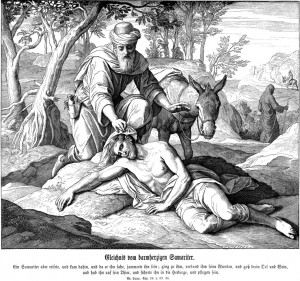====================
This sermon was preached on the Ninth Sunday after Pentecost, July 21, 2013, at St. Paul’s Episcopal Church, Medina, Ohio, where Fr. Funston is rector.
(Revised Common Lectionary, Pentecost 9 (Proper 11, Year C): Amos 8:1-12; Psalm 52; Colossians 1:15-28; and Luke 10:38-42. These lessons can be read at The Lectionary Page.)
====================
 In last week’s sermon I talked about the first three prophetic visions God reveals to Amos: a plague of locusts devouring the crops of ancient Israel, a catastrophic fire destroying everything in the nation, and the plumb line set in the midst of the nation’s people demonstrating that they were not upright. This week Amos is shown a fourth prophetic vision.
In last week’s sermon I talked about the first three prophetic visions God reveals to Amos: a plague of locusts devouring the crops of ancient Israel, a catastrophic fire destroying everything in the nation, and the plumb line set in the midst of the nation’s people demonstrating that they were not upright. This week Amos is shown a fourth prophetic vision.
The eighth chapter of this prophet opens with God showing Amos a basket of summer fruit, such things as peaches, apricots, nectarines, plums, and figs. We aren’t told the condition of the fruit, but some commentators suggest that it may be fruit that is over-ripe, maybe on the verge of going bad. They suggest this because God tells Amos that this vision means that “the end has come upon my people Israel; I will never again pass them by.” God’s explanation continues with visions of dead bodies in the street, wailing and lamentation in the temples, the nation destroyed, and the survivors wandering lost.
Well, it may be that the fruit is going bad, but in truth what God is doing is making a pun in Hebrew, a play on words that simply doesn’t translate into English. In Hebrew, the word for “summer fruits” is qayits; the word for “the end” is qets. The are spelled differently, but pronounced almost identically. Qayits . . . qets . . . God is making it clear that with respect to Israel, God is calling it quits! The finality of the passage is clear; Israel has no recourse.
And why has it come to this? Again, God is very clear, it’s because of economic injustice. God will punish the nation because its upper class, its wealthy merchants “trample on the needy.” They can’t wait Sabbaths and holy days to get over so they can resume their fraudulent business practices. They sell partial measures of wheat weighed on false scales that are overbalanced so that what is shown as a sheckel of wheat is far less. They measure ephahs of grain that are less than the regulation 35 liters. They “buy the poor for silver and the needy for a pair of sandals.” That they are described as “selling the sweepings of the wheats” suggests either that they are selling chaff as if it were good grain, or that they are selling even the gleanings which are required by the Law of Moses to be left for the homeless and the beggars. In short, God is more than a little unhappy about the disparity between the wealthy merchants and the poor who must buy from them.
In our world, as in ancient Israel, the overriding organizing principle of society is the market economy, profit at the bottom line: the measure for nearly everything is profit and how it can be increased. It is a principle which works on paper, yet it is not helpful when we encounter the most pressing issues in our society. By “society” I do not mean simply our nation, I mean our entire global society, but we do see this played out in our local and national communities.
We are concerned when our local superintendent of schools seems to abuse his financial privileges because we see our education system not keeping up in a world market. We complain about the cost of salaries and benefits for those who teach our children, and yet paradoxically use the superintendent’s apparent misuse of funds as an excuse to vote against school levies or otherwise reduce school budgets, as if cutting costs will improve our children’s education.
We have all witnessed the damage done to our environment by the continuing use of fossil fuels, and there is plenty of good scientific research indicating that it has resulted in man-made global climate change that is costing billions of dollars in storm damage, and disrupting (if not ending) the lives and livelihoods of millions of people. However, when solutions are proposed, the objection is always that it may impact the profitability of business.
The truth is that profitability is the wrong measure, that the market is unable to deal with these issues. The gap between rich and poor, between haves and have-not is huge when measured in dollars-and-cents; it is even more staggering when measured in education and quality of life, and it is continuing to grow.
Are we able to hear God’s word of justice spoken to Amos as applying to us? Do we even understand how clearly it applied to the ancient Israelites? Do we even remember that what was prophesied by Amos against them did, in fact, come to pass?
God’s word was given by Amos in approximately the year 750 BCE during the reign of Jeroboam II of the Kingdom of Israel. This is not the united monarchy of Saul, David, and Solomon; this is the northern kingdom which rebelled against Solomon’s son Rehoboam in about the year 930 BCE and set up Jeroboam I as a separate monarch in the region we now know as Samaria. These rebels included the tribes of Reuben, Simeon, Issachar, Zebulun, Dan, Naphtali, Gad, Asher, Ephraim, and Manasseh, ten of the twelve tribes. Only the tribes of Benjamin and Judah remained loyal to the House of David.
Ten tribes. Ten tribes. That ought to ring some bells; that ought to tickle something in your memory. These ten tribes are legendary, known to history as “the ten lost tribes of Israel.” Lost because less than twenty years after Amos prophesied that “dead bodies shall be cast out in every place,” it came to pass. Less than twenty years after God told them through Amos that their end would be bitter and that any survivors would “wander from sea to sea and from north to east . . . seeking the word of the Lord” and never finding it, that is exactly what happened. The Assyrian Empire invaded the northern Kingdom of Israel in 732 BCE and wiped . . . it . . . out . . .
Are we able to hear God’s word of economic justice spoken through Amos as applying to us? Not us the nation, but us the global economic society which cannot seem to divorce itself from the organizing principle of profit no matter what the issue may be, even when that organizing principle cannot address the issue. If we believe the witness of Holy Scripture, the ten lost tribes were lost, utterly destroyed, wiped from human history because God will not tolerate economic injustice!
Let’s leave that question for a moment and turn our attention to the Gospel lesson which seems at first glance to have little if any relationship to our Old Testament lesson. It is the familiar story of Jesus visiting his friends Mary and Martha of Bethany. He arrived and, like good friends and hosts, they held a dinner party. Luke does not tell us that others were present, but it would have been very much out of the ordinary for Jesus to have been alone with these women, so we can assume that others, at least their brother Lazarus, were there for the meal.
Martha, anxious for the comfort of their guest, busied herself with all the details of hospitality — setting the table, cooking, filling the glasses, bustling about will all of that sort of thing. Her sister Mary, however, did not pitch in to help. Instead, she sat with the other guests at Jesus feet, a student attentive to her teacher, listening to his words.
Martha, seeing Mary seeming not to care, became annoyed and ungracious. A word to her sister would probably have been sufficient to secure her help, but rather than do that Martha impatiently complained to Jesus: “Lord, do you not care that my sister has left me to do all the work by myself? Tell her then to help me.”
Jesus answered her, “Martha, Martha, you are worried and distracted by many things; there is need of only one thing. Mary has chosen the better part, which will not be taken away from her.” This text is commonly understood to contrast Mary’s attention to Jesus words — good — with Martha’s busy distraction — bad. But that’s overly simplistic and isn’t true to the spirit of Jesus teaching.
Martha has done the right thing; she has invited Jesus into her home and busied herself with the obligations of hospitality, something that Jesus values. The problem is that, as a hostess, she hasn’t been gracious; she hasn’t spent time with Jesus, her other guests, or even with her sister. She has let these tasks distract her. And worse, rather than speak with Mary directly and ask Mary directly for help, Martha did what we are all warned against; she dragged someone else into her tiff with her sister. It’s called “triangulation.” Like a school girl angry with a friend, she won’t talk directly to Mary, even when she’s in the same room: “Jesus, tell Mary (who was right there in the same room) to help me.” It’s a contentious move; it creates conflict.
It isn’t her busyness with hospitality and hosting, or her sister’s attention to his conversation, that Jesus referred to when he said, “There is need of only one thing.” Putting Mary to work at Martha’s task wasn’t what was required. It was something else. And to understand what it was, we have to step back from the gospel lesson and see this episode in context.
This visit with Mary and Martha happens immediately after Jesus has told the story we heard last week, the parable of the Good Samaritan. Remember that that story came in response to a question from a lawyer, “What must I do to inherit eternal life?”
In answer to that question, Jesus asked the lawyer what the Law of Moses says, to which the lawyer answered, “You shall love the Lord your God with all your heart, and with all your soul, and with all your strength, and with all your mind; and your neighbor as yourself. ”
Jesus told the lawyer that his answer was correct and then said, “Do this, and you will live.” The lawyer had given a two-part answer: love God — love your neighbor. But to Jesus it was not two things, but one. He did not say, “Do these.” He did not say, “Do those two thing.” He said, “Do this” — singular — one thing. Love God, love your neighbor. To Jesus, it’s one thing, one needful thing. (And, please, remember! This is not sloppy, emotional romantic love! This is Biblical love – chessed in Hebrew; agape in Greek – love which respects the dignity of human being, which promotes peace, and fosters justice.)
For Jesus, love is above and beyond all else. It takes precedence over every other consideration, every other organizing principle, every other motive. He will live by, and die because of, this one needful thing. He will stay true to this one thing even though it will mean his sacrifice on the cross of Calvary. “Through him,” writes Paul to the Colossians, and through the fullness of God, which is Love, which dwelt in him, “God was pleased to reconcile to himself all things, whether on earth or in heaven, by making peace through the blood of his cross.” Love is the one thing needful.
And that one thing is the answer to the economic injustice against which the prophet Amos railed. The answer does not and cannot lie within the context of the market economy itself. Just as taking Mary away from the conversation and putting her to work at Martha’s tasks would not really have answered Martha’s complaints and reconciled what had become the bitterness between them, simply taking money away from the rich and giving it to the poor will not correct economic injustice; it simply perpetuates it, giving the money a new owner, and making a new non-owner filled with resentment. Revolution, elevating the working proletariat above the rich merchant class, switching Mary for Martha, also is not the answer; it simply perpetuates the disparities by reversing the roles. The answer does not and cannot lie within the market economy; it must be found in a different context.
Reducing people to commodities — “buying the poor for silver and the needy for a pair of sandals” — being eager to sell on the Sabbath, shorting measures, and cutting corners were commonplace, if not integral, to the economy of ancient Israel; they are commonplace, if not integral, to all market economies. But these practices and attitudes of markets, like Martha’s bustling busyness, lack one thing needful. They lack love — love which respects dignity, promotes peace, and fosters justice. And because they lacked love, the ten tribes of the northern kingdom became lost, utterly destroyed, wiped from the human history because God will not tolerate economic injustice!
We must come to the realization as a society, as a global economic society, that we are no different from the lost tribes of Israel. That for many aspects of our modern life — health, education, clean air and water, public safety — profitability is the wrong measure, just as it was for them. The market was and is unable to deal with these issues; it was and is the wrong context within which to solve these and many other of society’s ills. As the Psalm for today says, we must stop trusting in great wealth; we must stop relying upon wickedness; we must, instead, trust in the mercy of God. In these areas of our common life, we need to change society’s organizing principle from market economics to gospel values, from profit as the bottom line to biblical love – dignity, peace, justice – as the bottom line.
It is the one thing needful. Amen.
====================
A request to my readers: I’m trying to build the readership of this blog and I’d very much appreciate your help in doing so. If you find something here that is of value, please share it with others. If you are on Facebook, “like” the posts on your page so others can see them. If you are following me on Twitter, please “retweet” the notices of these meditations. If you have a blog of your own, please include mine in your links (a favor I will gladly reciprocate). Many thanks!
====================
Father Funston is the rector of St. Paul’s Episcopal Church, Medina, Ohio.
 In truth, this is Amos objecting to Amaziah, the priest at Bethel, that he, Amos, is not an official prophet, not a member of one of the recognized or sanctioned schools of prophecy, but the first part of it has always sounded to me as if Amos is protesting his commission to prophesy, trying to get out of doing what God wants him to do. “Hey, that’s not what I do! I can’t be a prophet because I have these sheep and these figs to take care of!”
In truth, this is Amos objecting to Amaziah, the priest at Bethel, that he, Amos, is not an official prophet, not a member of one of the recognized or sanctioned schools of prophecy, but the first part of it has always sounded to me as if Amos is protesting his commission to prophesy, trying to get out of doing what God wants him to do. “Hey, that’s not what I do! I can’t be a prophet because I have these sheep and these figs to take care of!” I’m sitting here this morning knowing full well that I should be writing something about Advent and, truth be told, there are other parts of today’s daily readings that would lend themselves to an Advent reflection. But…. yesterday a federal court in Michigan decreed that the city of Detroit could carry on with a restructuring of its debt through bankruptcy and, more importantly and more destructively, that among the obligations that could be discharged are its pension responsibilities to former municipal employees. I was deeply troubled by that news when I heard it yesterday morning and I’ve been pondering it since.
I’m sitting here this morning knowing full well that I should be writing something about Advent and, truth be told, there are other parts of today’s daily readings that would lend themselves to an Advent reflection. But…. yesterday a federal court in Michigan decreed that the city of Detroit could carry on with a restructuring of its debt through bankruptcy and, more importantly and more destructively, that among the obligations that could be discharged are its pension responsibilities to former municipal employees. I was deeply troubled by that news when I heard it yesterday morning and I’ve been pondering it since. This series of questions is asked by Amos just before he asks, “Does disaster befall a city unless the Lord has done it?” (v. 6b) He’s provoking his readers (originally, his listeners) to answer each preliminary question, “Of course not” so that their answer to his capper will also be “Of course not.”
This series of questions is asked by Amos just before he asks, “Does disaster befall a city unless the Lord has done it?” (v. 6b) He’s provoking his readers (originally, his listeners) to answer each preliminary question, “Of course not” so that their answer to his capper will also be “Of course not.”  In last week’s sermon I talked about the first three prophetic visions God reveals to Amos: a plague of locusts devouring the crops of ancient Israel, a catastrophic fire destroying everything in the nation, and the plumb line set in the midst of the nation’s people demonstrating that they were not upright. This week Amos is shown a fourth prophetic vision.
In last week’s sermon I talked about the first three prophetic visions God reveals to Amos: a plague of locusts devouring the crops of ancient Israel, a catastrophic fire destroying everything in the nation, and the plumb line set in the midst of the nation’s people demonstrating that they were not upright. This week Amos is shown a fourth prophetic vision.  The nation’s legal system is corrupt; justice is for sale to the highest bidder. The guilty go free while the innocent suffer and die. The rich are crushing the poor. The affluent, the 1%-ers, are living a lavish life, with their costly perfumes and cosmetics, and their vacation homes with expensive furnishings, pleasure palaces where they can throw extravagant parties with music in every room. They revel in sexual debauchery of all sorts, but try to enforce a puritanical moral code on the rest of society. The poor are at the mercy of predatory lenders who exploit vulnerable families. The rich have more than enough to eat and to waste, while the poorest in the society go hungry. And government and religious leaders not only allow this to happen, they help it happen.
The nation’s legal system is corrupt; justice is for sale to the highest bidder. The guilty go free while the innocent suffer and die. The rich are crushing the poor. The affluent, the 1%-ers, are living a lavish life, with their costly perfumes and cosmetics, and their vacation homes with expensive furnishings, pleasure palaces where they can throw extravagant parties with music in every room. They revel in sexual debauchery of all sorts, but try to enforce a puritanical moral code on the rest of society. The poor are at the mercy of predatory lenders who exploit vulnerable families. The rich have more than enough to eat and to waste, while the poorest in the society go hungry. And government and religious leaders not only allow this to happen, they help it happen.  In our lessons today, we have two stories about silencing the prophetic voice. First, a snippet of the not-very-familiar story of the Prophet Amos which is, frankly, cut from its context so badly that some explanation really is necessary. Second, the almost-too-familiar story of the beheading of John the Baptizer.
In our lessons today, we have two stories about silencing the prophetic voice. First, a snippet of the not-very-familiar story of the Prophet Amos which is, frankly, cut from its context so badly that some explanation really is necessary. Second, the almost-too-familiar story of the beheading of John the Baptizer. 

